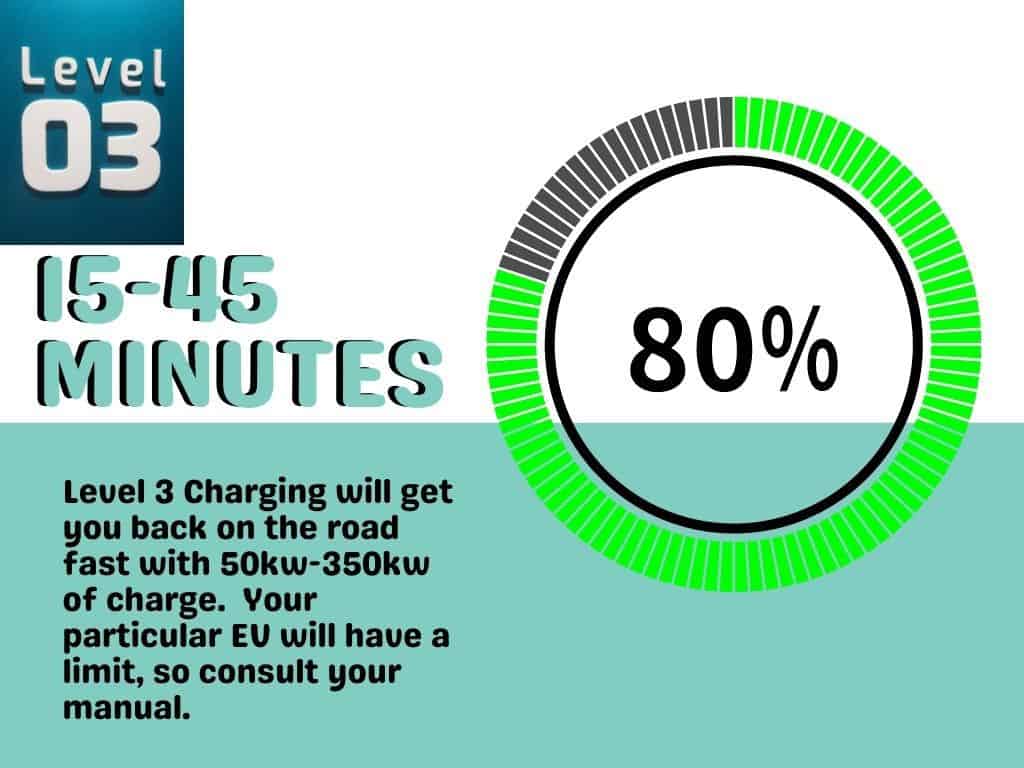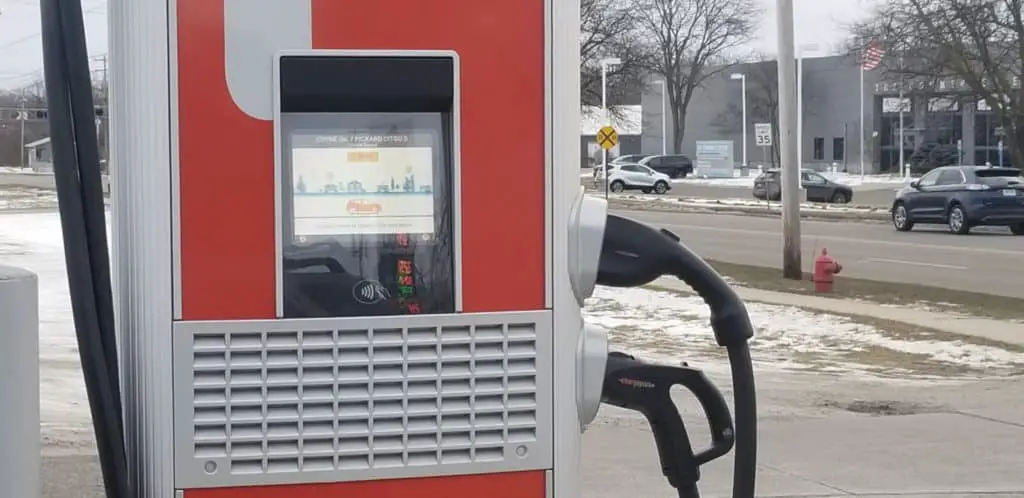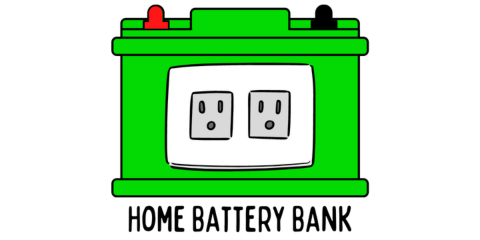More and more at gas stations around the country we are seeing the green lights on the side of the property which are a telltale sign of an electric vehicle charging station.
You know that it will take roughly 5 minutes to simply pump gas for a conventional vehicle, or maybe 10 if you were to run inside and buy something, but how do the charging times for electric vehicles stack up against that?
The average electric vehicle can recharge up to 80% capacity within 15-45 minutes at a gas station’s EV charging hub which will generally supply 50-350kW of electricity. The speed of the charge primarily depends on the total battery capacity of the vehicle and the rated charging speed of the hub.
Let’s take a look at the top 11 selling EV’s and what you might expect for charging times based on what your gas station’s kilowatt rating, how much power gas station chargers supply, how these charging stations work, and how much it costs to charge an EV at a gas station.
How Long Does it Take to Charge at a Gas (Charging) Station?
In the following table, you’ll see the top 11 selling electric vehicles over the last year according to Car and Driver.
You’ll see the usable battery (the amount that can be charged and used for propulsion), the maximum charging limit, and then 3 charging speeds you might find at your gas station’s EV charging hub. The times listed below the charging speeds are in minutes.
As you can see, you will be able to bring most vehicles up to 80% from 10% in less than 30 minutes. Depending on your electric vehicle, it’s not uncommon to recharge 8-15 miles per minute of Level 3 charging at a gas station.
| EV Model | Year | Net Battery Capacity (Usable) | Level 3 Charging Limit in Kilowatts | 50kW Charging Minutes | 150kW Charging Minutes | 350kW Charging Minutes |
|---|---|---|---|---|---|---|
| Tesla Model Y | 2022 | 75kW | 210 | 66 | 22 | 16 |
| Tesla Model 3 | 2022 | 82kW | 250 | 73 | 24 | 15 |
| Ford Mustang Mach E | 2022 | 91kW | 250 | 80 | 27 | 16 |
| Chevy Bolt EV | 2022 | 65kW | 55 | 57 | 52 | 52 |
| Volkswagen ID.4 | 2022 | 77kW | 135 | 68 | 25 | 25 |
| Nissan Leaf | 2022 | 62kW | 100 | 55 | 27 | 27 |
| Audi e-tron | 2022 | 91.5kW | 150 | 81 | 27 | 27 |
| Porsche Taycan | 2022 | 83.7kW | 270 | 74 | 25 | 14 |
| Tesla Model S | 2022 | 98kW | 250 | 87 | 29 | 17 |
| Hyundai Kona Electric | 2022 | 64kW | 75 | 57 | 38 | 38 |
| Tesla Model X | 2022 | 95kW | 250 | 84 | 28 | 17 |
Below I’ve provided an easy to use calculator to help you get a ballpark estimate of how long it will take you to charge your particular EV. Simply use the sliders to indicate your EV’s battery size, the current state of charge, the desired state of charge, and the charging kilowatts.

What is the Charging Power at an EV Charging Station?
As a general rule, a designated EV charging station will have 50-350kW of DC power (Level 3) and will charge an EV in 15-45 minutes, depending on the model and charging kilowatts. Some charging stations also offer Level 2 charging speeds with AC power at 240 volts and around 7kW.
How Does Charging at a Charging Station Work?
Charging your EV at a designated charging station outside of your home is completely different from charging your EV battery in your garage and one of the primary differences is the type of electricity supplied.
When you charge your EV in your garage, with either Level 1 or Level 2 charging, you are using either 120VAC (VAC = volts of alternating current) or 240VAC. When you go to a designated charging station, you are using DC, or Direct Current (unless, of course, you’re using a Level 2 charger at a public station).

In your garage, the AC current passes through your EVSE (electric vehicle supply equipment), or the cord that plugs into both your wall receptacle and your car’s charging port.
That alternating current (AC) flows to a charging converter that is built into your vehicle and it is converted to direct current (DC). From there, your EV’s onboard charger can use the DC current to recharge the battery.
Batteries can only accept DC current.
During this process, there is heat loss and other inefficiencies in the conversion process and you’ll probably end up with a charging efficiency of about 80-90% in relatively ideal conditions and temperatures.
That means that if you need to replenish 20kWh of battery life and your efficiency is 80%, you’ll use 25kW of electricity from the wall to accomplish that.
Charging at a designated charging station is much different for 2 primary reasons:
- It uses DC current and is more efficient (it doesn’t have to convert AC to DC power)
- It is faster (greater kilowatt input)
Because a charging station uses DC power, the charging station itself is the charger (relatively speaking) and the electricity flowing into your car will now bypass the converter and flow directly into the battery. Of course, the car will still monitor the inputs and only supply the battery with what it can accept, but the car no longer has to swap AC to DC power and lose out on efficiency.
When this conversion in your vehicle is taken out of the process, the efficiency now increases to 90-99%.
How Much Does it Cost to Charge an Electric Car at a Charging Station?
As a national average, a charging station will charge $0.30-$0.35 per minute of Level 3 fast charging at speeds 50kW or more, or $0.35-$0.45 per kilowatt-hour. Public Level 2 charging stations will typically charge around $0.02-$0.03 per minute.
When it comes to paying for your charging needs, it’s still a bit of the “Wild West” when it comes to how it’s done.
When looking at a single provider (Electrify America), half of the states where it is present pay per minute, whereas half of them pay per kilowatt hour replenished.
Competing companies right across the street from each other might charge by the minute, by the kilowatt hour, a flat rate, or any other combination and be the complete opposite of their competitor next door.
One company’s rates might be low and the other might be high.
Discounted rates may also be available to rewards members of the individual charging suppliers.
You can check out Electrify America’s map and EVGo’s map to get an idea of what prices are near your particular location.
